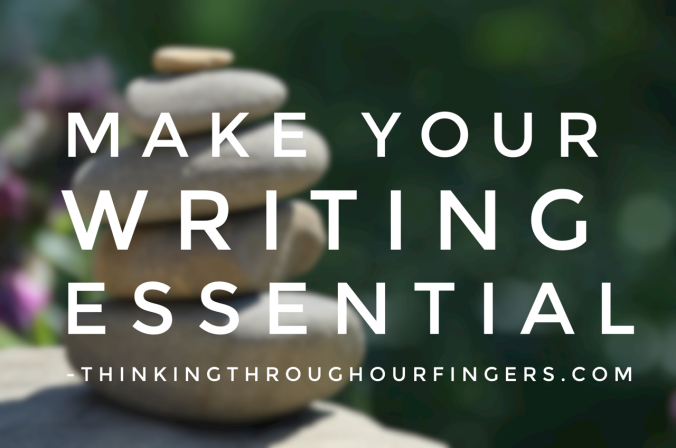Make Your Writing Essential
I think a lot of people may look back at 2016 as a year of unpredictable changes, and it was definitely the case for me. Some of the notable events of 2016 in my personal life included:
- Applying, interviewing for, and receiving a new job.
- Getting a diagnosis and medication for depression.
- Buying a house.
- Signing with an agent.
- Editing, re-editing, and going on submission for a novel.
Those are a lot of big life things and don’t include the crazy life events that 2016 delivered to people close to me. It was enough of a disruption that at times I felt a bit like Dorothy in The Wizard of Oz, being flipped here and there without any ability to get a solid footing in my life.

It was in the middle of all those events that I came across Essentialism by Greg McKeown. It had been mentioned by several different friends and colleagues who didn’t have involvement with each other that I snagged it up when it showed up on sale on Audible.
Before I was through the first chapter, I was recommending the book to friends.
Here’s the thing: I’ve always been a person who could get a lot done. I’m just wired that way. But, as my kids have gotten older, as my husband has had additional responsibilities, and as I have been working on helping out in my community, I found I was falling back into the trap of saying yes when I really REALLY needed to say no. I’d forgotten what McKeown emphasized over and over again.
The real question is not how can we do it all, it is who will get to choose what we do and don’t do. Remember, when we forfeit our right to choose, someone else will choose for us. So we can either deliberately choose what not to do or allow ourselves to be pulled in directions we don’t want to go.
— Greg McKeown, Essentialism: The Disciplined Pursuit of Less
I’d forfeited control of my life in exchange for trying to please others. This is not the first time I’ve had to learn this lesson. I know it won’t be the last. But establishing writing as a top priority isn’t going to happen overnight. It’s not going to come from someone else. If writing is to have an essential role in our lives, it has to come from us.

But as I say to my kids all the time, after they have responded with “I know” to whatever it was I was asking or reminding them to do, knowing and doing are two different things. So, here are a few tips I use when trying to solidify the essential nature of writing in my life.
1. Choice.
I have one. You have one. Yes, there are days when we make a choice to engage in something that takes us away from our writing. And yes, it is easy on those days to cast all the reasons we didn’t get writing in on someone or something else. But as soon as we say we didn’t have a choice, we play the victim card, and personal experience suggests this path is lined with “I never get to…” and “Everyone always…” and “I wish I could…” and it is a very difficult path to get off of.
2. Discipline.
The sub-title of Essentialism is intentional: it is the disciplined pursuit of less. It is easy to take in more, to say yes when people ask, to take in things because we don’t want to disappoint others. McKeown talks about the closet test, which is to think about your closet, about the things you keep in there. If you are deciding between allowing something to stay or giving it a new home, he suggests asking yourself how much you would pay to buy it again.
$5.00?
$10?
$50?
$100?
Taking this idea with writing, think about the value of things you are allowing to take over your writing time. I think most of us would agree that nurturing a sick child and binge-watching something on Netflix don’t have the same value. In a world where stuff can quickly take over our lives, where filler can eat away at our time, mindfully considering what we consider to be of value is mandatory before we can be disciplined in our efforts.
3. Routine.
Think about what you do when you first arrive back at your home from wherever. Where do you put your keys? Wallet? Phone? Where do you sit? What do you do while sitting there?
Now, for the important question: Why?
Why do you put your phone, wallet, and keys where you do? Was it a place you designated on purpose or is it wherever you are at the time you put them down?
When you get back home, is it “natural” to turn on the TV? Check the social media app of your choice?
Routines are the best and worst companions in life. They can be the thing that allows you to have success or that makes you feel unaccomplished. And they are tricky to sort out. However, getting a routine in place, a little at a time, can be the greatest assistance to achieving writing and/or deadline goals. Think about how you like to write, where you like to write, and how it feels “just right” and then just write. If you can get this routine set up at a particular time and place every day, you will most certainly see consistent progress that makes it easier to work through the days of mediocrity because you know you will be back there the next day to work again.
Focusing on the essentials is key to accomplishing our writing goals.